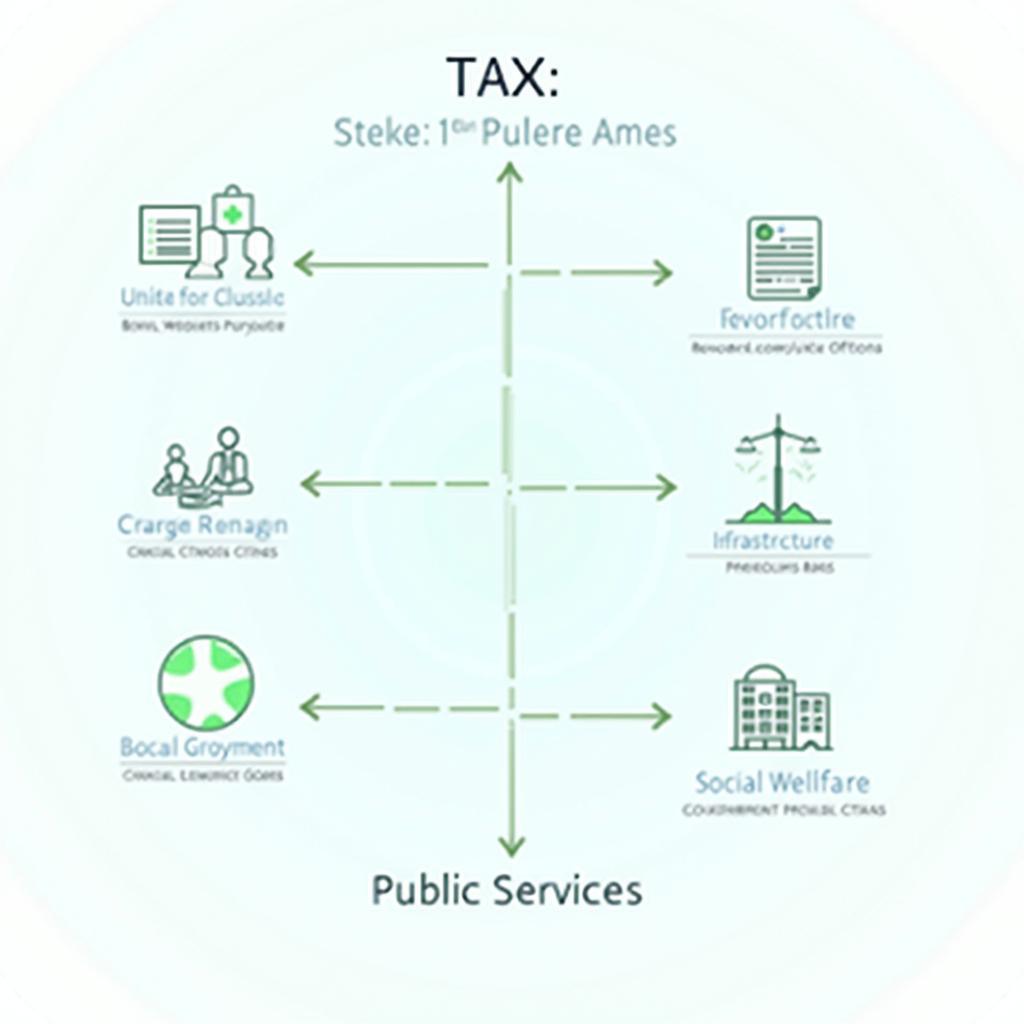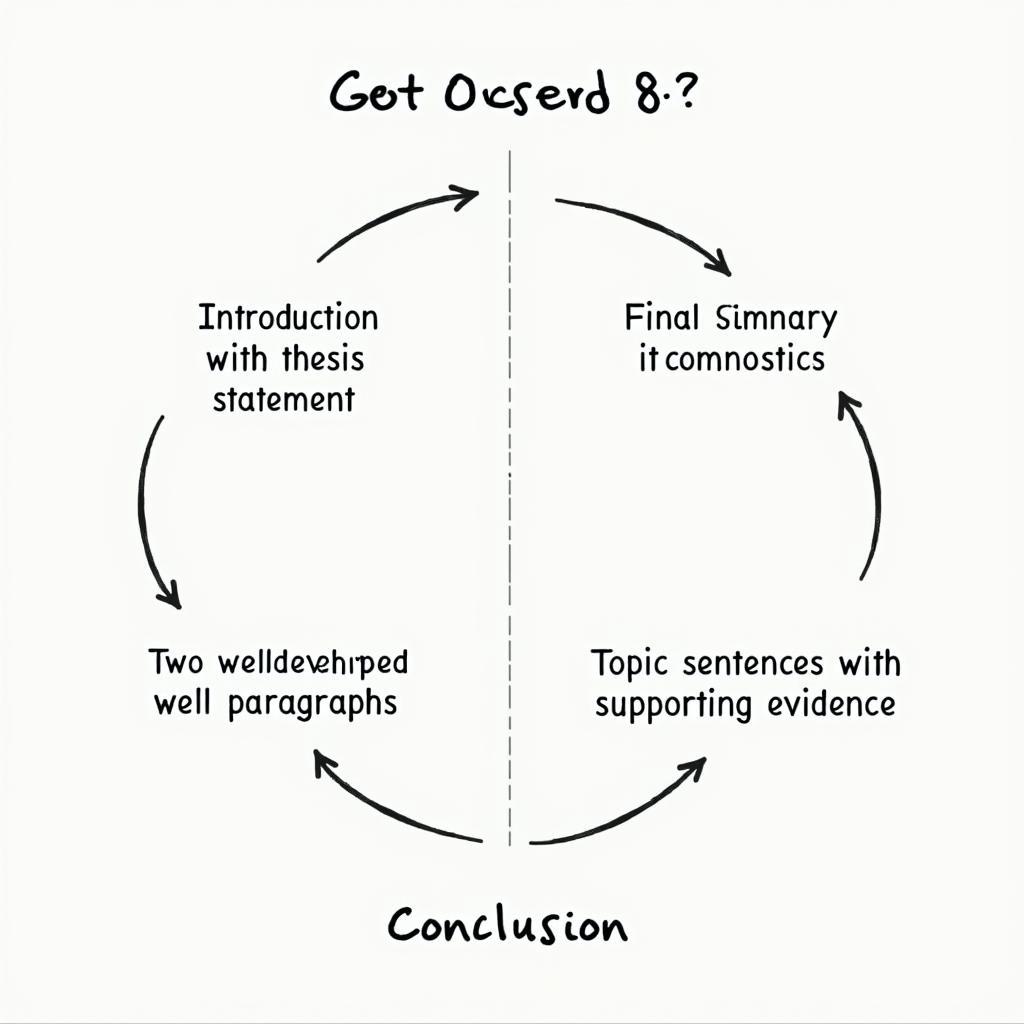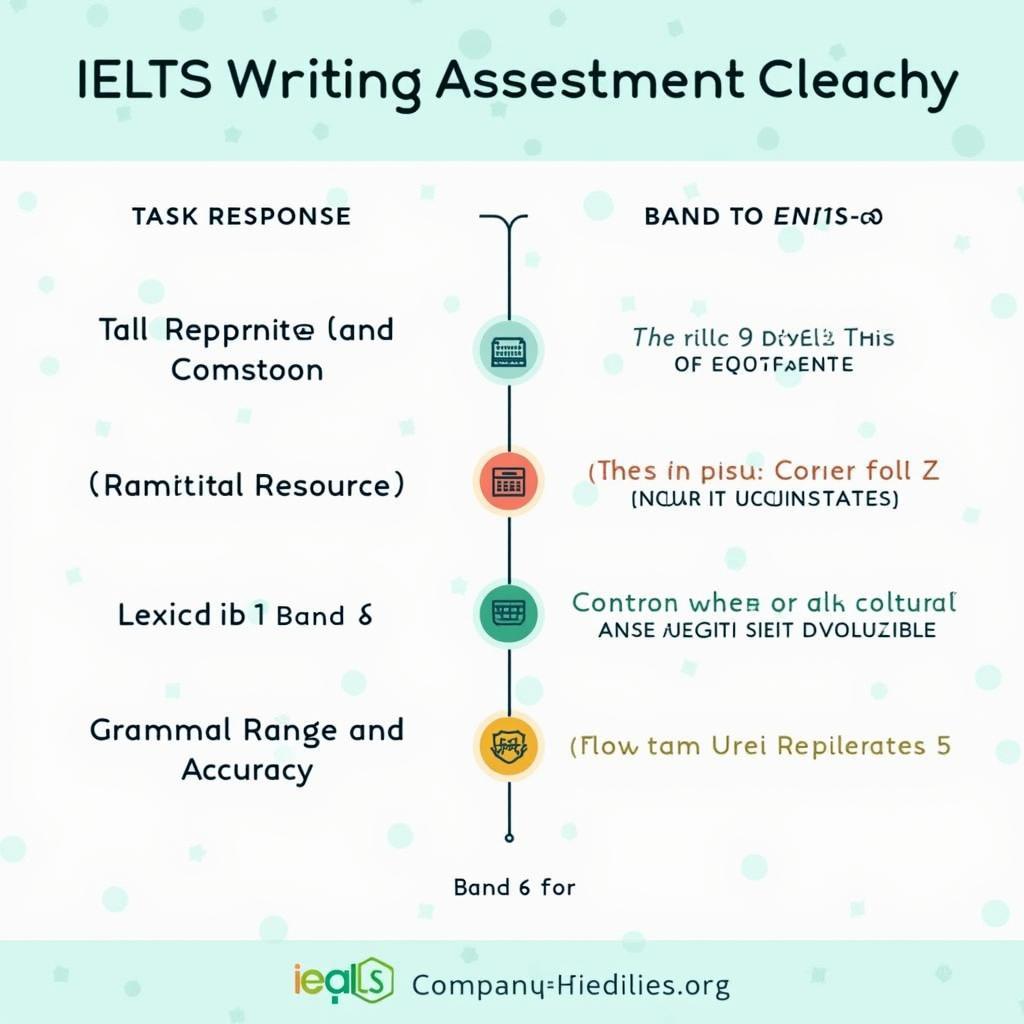Introduction
The topic of renewable energy has become increasingly prevalent in IELTS Writing Task 2 examinations over recent years, reflecting global concerns about climate change and sustainable development. This comprehensive guide provides authentic sample essays across different band scores, detailed analyses, and practical strategies to help you excel in your IELTS writing examination.
Table Of Contents
- Introduction
- Question & Analysis
- Band 8-9 Sample Essay
- Band Score Analysis
- Band 6.5-7 Sample Essay
- Band Score Analysis
- Band 5-6 Sample Essay
- Band Score Analysis
- Learning from Mistakes
- Essential Vocabulary
- High-Scoring Sentence Structures
- 1. Complex Subordination with Concessive Clauses
- 2. Non-Defining Relative Clauses
- 3. Participial Phrases
- 4. Cleft Sentences for Emphasis
- 5. Advanced Conditionals (Mixed and Inverted)
- 6. Inversion for Emphasis
- Self-Assessment Checklist
- Before Writing (5 minutes)
- While Writing (35 minutes)
- After Writing (10 minutes)
- Time Management Tips
- Conclusion
In this article, you will discover three complete sample essays (Band 8-9, Band 6.5-7, and Band 5-6), scoring breakdowns aligned with official IELTS descriptors, essential vocabulary, and high-scoring grammatical structures. Whether you’re aiming to improve from Band 6 to 7 or striving for that elusive Band 8, this resource offers actionable insights for your preparation.
Verified Past IELTS Questions on Renewable Energy:
-
“Some people believe that governments should invest more money in developing renewable energy sources, while others think this money should be spent on improving public transport. Discuss both views and give your own opinion.” (Academic Test, 2022)
-
“The advantages of using renewable energy outweigh the disadvantages. To what extent do you agree or disagree?” (General Training Test, 2023)
-
“Some people think that renewable energy is too expensive and unreliable to replace fossil fuels. Do you agree or disagree with this statement?” (Academic Test, 2021)
Question & Analysis
The advantages of using renewable energy outweigh the disadvantages. To what extent do you agree or disagree?
Question Type: Opinion Essay (Agree/Disagree)
Key Terms Explained:
- Advantages/Disadvantages: You must consider both positive and negative aspects
- Outweigh: Implies a comparison – which side is stronger?
- To what extent: Requires a clear position on a scale from complete agreement to complete disagreement
Common Pitfalls:
- Only discussing advantages without acknowledging disadvantages
- Presenting a balanced view without taking a clear position
- Failing to compare the weight of advantages versus disadvantages
- Not supporting claims with relevant examples
Strategic Approach:
- Take a clear stance in your introduction
- Acknowledge the opposing view (disadvantages) in one paragraph
- Develop your main argument (advantages) more thoroughly
- Use specific examples to support your position
- Conclude by reaffirming why advantages outweigh disadvantages
Understanding the benefits of renewable energy in combating climate change provides crucial context for approaching this question effectively, as environmental benefits form a cornerstone of many high-scoring responses.
Band 8-9 Sample Essay
Characteristics of Band 8-9 Writing:
A Band 8-9 essay demonstrates sophisticated vocabulary, varied grammatical structures, clear argumentation, and seamless coherence. It addresses all parts of the question with well-developed ideas and relevant examples.
While renewable energy sources present certain implementation challenges, I firmly believe that their environmental, economic, and social benefits significantly outweigh any drawbacks, making them essential for sustainable development in the twenty-first century.
Admittedly, renewable energy systems do present initial disadvantages that warrant consideration. The most significant concern is the substantial upfront investment required for infrastructure development, with solar farms and wind turbines demanding capital outlays that can strain government budgets. Furthermore, the intermittent nature of sources like wind and solar power creates reliability issues, as energy generation fluctuates depending on weather conditions. In Germany, for instance, periods of low wind production have occasionally necessitated reverting to conventional power sources to maintain grid stability.
Nevertheless, the environmental advantages of renewable energy far exceed these practical concerns. Unlike fossil fuels, renewable sources produce negligible greenhouse gas emissions, directly addressing the climate crisis that threatens global ecosystems. Costa Rica’s achievement of running on 99% renewable energy for consecutive years demonstrates that nations can dramatically reduce their carbon footprint while maintaining modern living standards. Moreover, renewable energy eliminates the air pollution responsible for millions of premature deaths annually, offering immediate public health benefits that no fossil fuel alternative can match.
The economic merits are equally compelling. Although initial costs are substantial, the operational expenses of renewable facilities are minimal compared to fossil fuel plants that require constant fuel purchases. Solar panel costs have plummeted by over 80% in the past decade, making renewable energy increasingly cost-competitive. Additionally, the renewable sector is a powerful engine for job creation, with the International Renewable Energy Agency reporting that the industry employed 12 million people globally in 2020, a figure projected to reach 42 million by 2050.
In conclusion, while transitional challenges exist, the overwhelming environmental and economic advantages of renewable energy make it an indispensable investment in humanity’s future. Governments should therefore accelerate the transition through supportive policies and strategic investments.
(Word count: 324)
Band Score Analysis
| Criteria | Band | Justification |
|---|---|---|
| Task Response | 9 | Fully addresses all parts of the task with a clear, well-developed position throughout. Presents relevant, extended, and well-supported ideas with sophisticated examples (Costa Rica, Germany, IRENA statistics). |
| Coherence & Cohesion | 9 | Seamlessly organized with sophisticated use of cohesive devices (“Admittedly,” “Nevertheless,” “Moreover”). Clear progression from acknowledging disadvantages to comprehensively arguing for advantages. Each paragraph has a clear central topic. |
| Lexical Resource | 8 | Wide range of vocabulary used naturally and precisely (“substantial upfront investment,” “intermittent nature,” “negligible greenhouse gas emissions”). Minor flexibility in collocations prevents a Band 9. Vocabulary is contextually appropriate. |
| Grammatical Range & Accuracy | 9 | Wide range of structures used with full flexibility and accuracy. Complex sentences with subordinate clauses, participial phrases, and relative clauses are error-free. Demonstrates mastery of both simple and complex forms. |
Why This Essay Excels:
- Clear position from the start: The thesis statement unambiguously states the writer’s agreement
- Sophisticated concession paragraph: Acknowledges disadvantages before refuting them, showing critical thinking
- Specific, relevant examples: Costa Rica, Germany, and IRENA statistics add credibility and depth
- Advanced cohesive devices: Uses “Admittedly,” “Nevertheless,” “Moreover” to guide the reader seamlessly
- Varied sentence structures: Combines complex subordination, relative clauses, and participial phrases naturally
- Strong topic sentences: Each paragraph begins with a clear statement of its main idea
- Effective conclusion: Reaffirms the position while providing a forward-looking recommendation
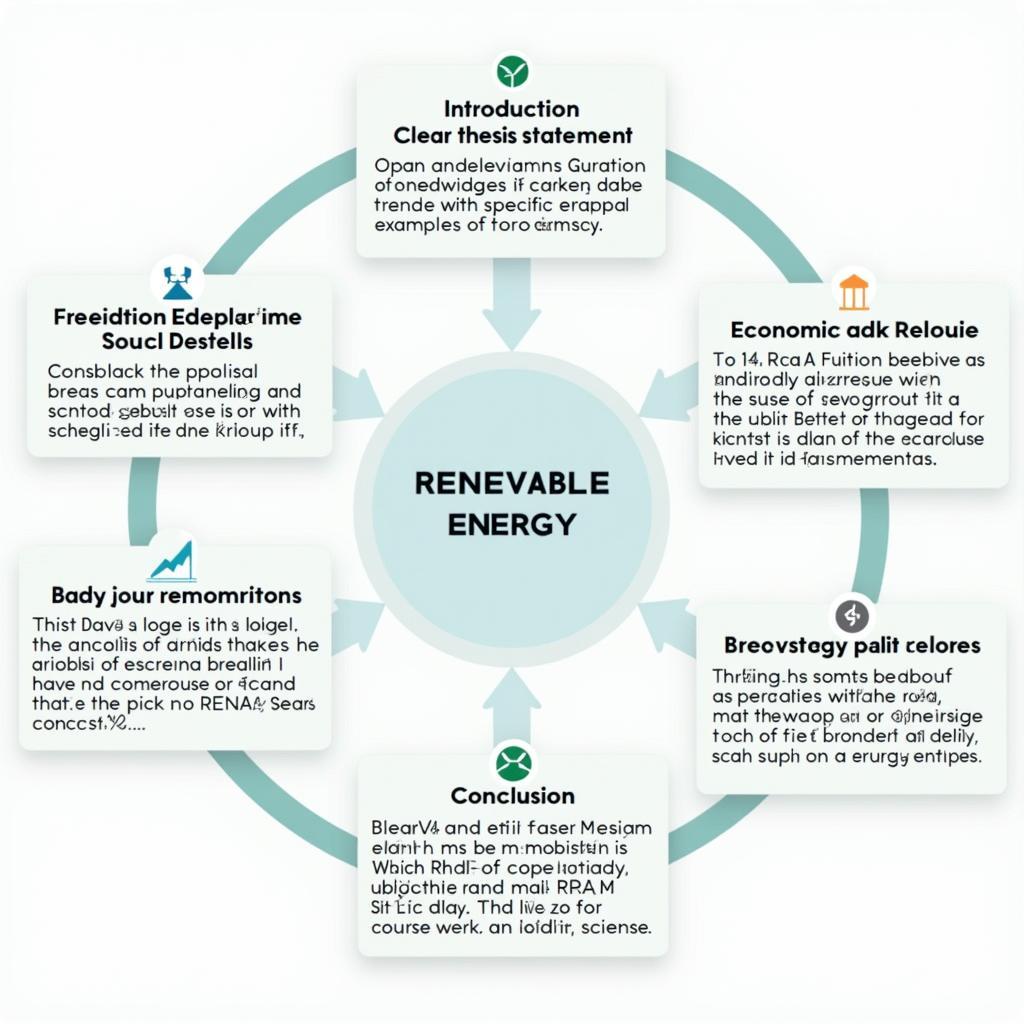 IELTS Writing Task 2 Band 9 Essay Structure for Renewable Energy Topic
IELTS Writing Task 2 Band 9 Essay Structure for Renewable Energy Topic
Band 6.5-7 Sample Essay
Characteristics of Band 6.5-7 Writing:
A Band 6.5-7 essay demonstrates good vocabulary and grammar control with occasional errors, addresses all parts of the task adequately, and presents relevant main ideas, though development may be less thorough than Band 8-9.
In today’s world, renewable energy is becoming more important for many countries. I strongly agree that the advantages of using renewable energy are greater than the disadvantages because it helps protect the environment and creates economic opportunities.
On the one hand, there are some disadvantages of renewable energy that we should consider. Firstly, the initial cost of installing renewable energy systems like solar panels or wind turbines is very high. Many developing countries cannot afford to invest such large amounts of money in these technologies. Secondly, renewable energy sources are not always reliable. For example, solar power cannot generate electricity at night or during cloudy days, which means countries need backup energy sources.
On the other hand, I believe the advantages are much more significant. The main benefit is that renewable energy is clean and does not produce harmful emissions. This is extremely important because air pollution from fossil fuels causes serious health problems and contributes to climate change. Countries that use more renewable energy, such as Denmark, have reduced their carbon emissions significantly. Another important advantage is that renewable energy creates new jobs. The solar and wind industries employ millions of people worldwide, and this number is growing every year.
Furthermore, renewable energy can help countries become more independent. Nations that rely on imported oil and gas often face economic problems when fuel prices increase. By developing their own renewable energy resources, countries can reduce this dependency and save money in the long term. Although the initial investment is expensive, the operational costs are much lower than fossil fuel power plants.
In conclusion, while renewable energy has some challenges related to cost and reliability, I believe the environmental, economic, and energy security benefits are much greater. Governments should continue investing in renewable energy technologies to ensure a sustainable future.
(Word count: 311)
Band Score Analysis
| Criteria | Band | Justification |
|---|---|---|
| Task Response | 7 | Addresses all parts of the task with a clear position maintained throughout. Main ideas are relevant and supported with examples (Denmark), though development is less extended than Band 8-9. |
| Coherence & Cohesion | 7 | Information and ideas are logically organized with clear progression. Uses cohesive devices effectively (“On the one hand,” “Furthermore”) though with some mechanical use. Paragraphing is appropriate. |
| Lexical Resource | 6.5 | Adequate range of vocabulary for the task with some attempts at less common words (“dependency,” “operational costs”). Some minor errors in word choice and collocation that don’t impede communication. |
| Grammatical Range & Accuracy | 7 | Uses a variety of complex structures with good control. Produces frequent error-free sentences with only occasional minor errors that do not impede communication. Some variety in sentence forms. |
Direct Comparison with Band 8-9:
| Aspect | Band 6.5-7 | Band 8-9 |
|---|---|---|
| Opening | “In today’s world” (generic) | Context-specific, sophisticated thesis |
| Examples | General (Denmark mentioned briefly) | Specific statistics (99%, 80%, 12-42 million) |
| Vocabulary | “very high,” “extremely important” | “substantial upfront investment,” “negligible emissions” |
| Cohesion | Basic linking (“On the one hand,” “Furthermore”) | Sophisticated (“Admittedly,” “Nevertheless,” “Moreover”) |
| Development | Ideas stated but less extended | Fully developed with multiple supporting points |
| Complexity | Mix of simple and some complex sentences | Consistent use of varied, complex structures |
For students interested in exploring more specific contexts, examining the benefits of renewable energy for rural development can provide additional examples to strengthen your argumentation in similar tasks.
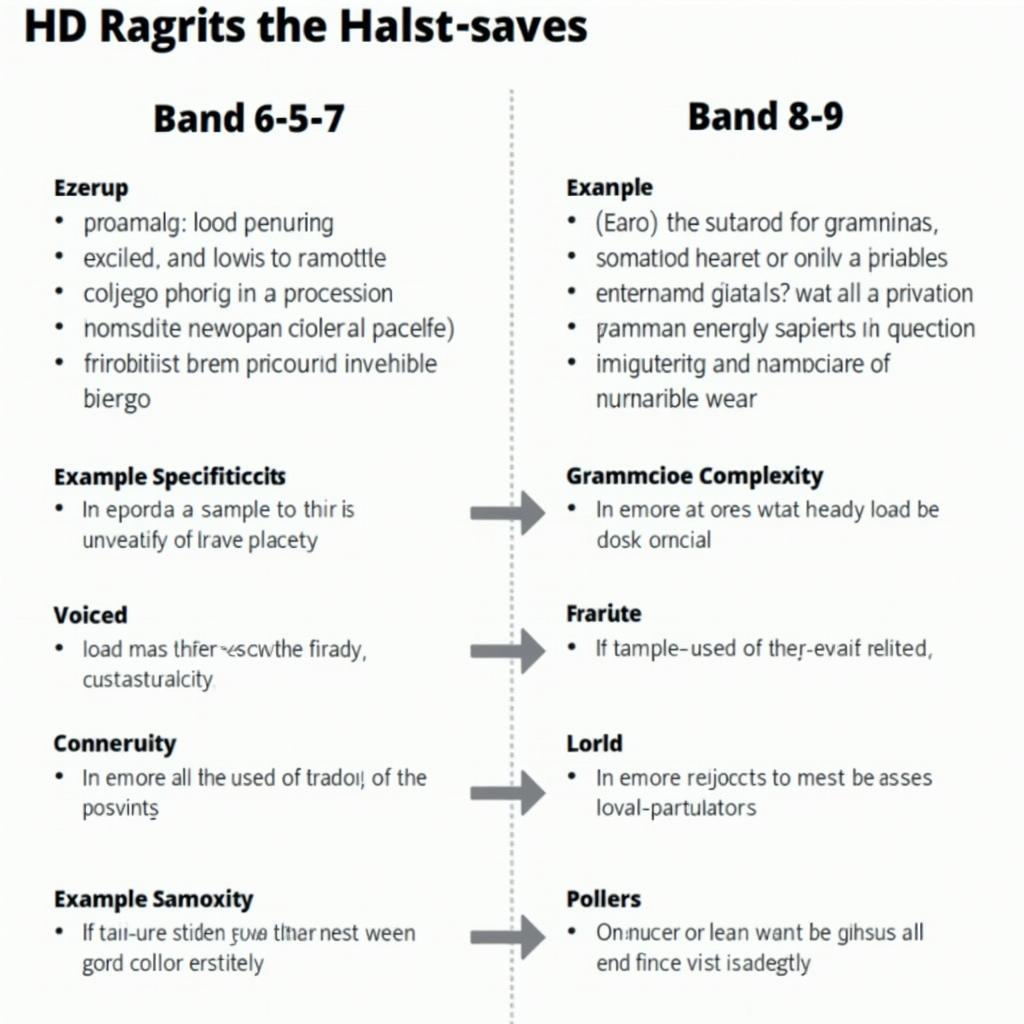 Comparing IELTS Band 6.5-7 and Band 8-9 Writing Features in Renewable Energy Essays
Comparing IELTS Band 6.5-7 and Band 8-9 Writing Features in Renewable Energy Essays
Band 5-6 Sample Essay
Characteristics of Band 5-6 Writing:
A Band 5-6 essay attempts to address the task with a position, though it may be unclear at times. It uses basic cohesive devices, limited vocabulary range with noticeable errors, and simple grammatical structures with frequent errors that occasionally reduce clarity.
Nowadays, renewable energy is very popular topic in the world. Some people think it have many advantages, but others think it have disadvantages too. I think the advantages is more than disadvantages.
First, renewable energy is good for environment. Fossil fuels like coal and oil makes a lot of pollution and it is bad for the earth. When we use solar energy or wind energy, it don’t make pollution. This is very important because pollution cause many problems like global warming and people get sick from dirty air. My country also have problem with air pollution, so I think renewable energy can help to solve this problem.
Second advantage is renewable energy can save money. Although it is expensive to build solar panels or wind turbines at the beginning, but after that it is cheap to use. We don’t need to buy fuel all the time. Also, renewable energy will never finish because sun and wind is always there. But fossil fuels will finish one day because they are limited.
However, there is also some disadvantages. The biggest problem is renewable energy cost a lot of money to start. Poor countries don’t have enough money to build this technology. Another problem is sometimes renewable energy is not reliable. For example, if there is no sun or wind, we cannot make electricity. So we need to have other sources of energy too.
In conclusion, I believe renewable energy have more advantages than disadvantages. Even though it is expensive and not always reliable, but it is clean and will help protect our environment for future. Government should invest more money in renewable energy.
(Word count: 287)
Band Score Analysis
| Criteria | Band | Justification |
|---|---|---|
| Task Response | 6 | Addresses all parts of the task with a relevant position, though ideas are underdeveloped and conclusions may be unclear. Uses some relevant examples but lacks specificity and extension. |
| Coherence & Cohesion | 5 | Information is organized with some progression, but cohesive devices are basic and sometimes faulty (“but after that”). Paragraphing is present but not always logical. |
| Lexical Resource | 5 | Limited vocabulary range with noticeable spelling and word formation errors (“is more than,” “makes a lot of pollution”). Attempts to use less common vocabulary but with frequent inaccuracy. |
| Grammatical Range & Accuracy | 5 | Uses only a limited range of structures with only rare use of subordinate clauses. Frequent grammatical errors (“it have,” “don’t make,” “is expensive…but after”) that may cause difficulty for the reader. |
Learning from Mistakes
| Mistake | Error Type | Correction | Explanation |
|---|---|---|---|
| “renewable energy is very popular topic” | Article omission | “renewable energy is a very popular topic” | Countable singular nouns require an article (a/an/the). “Topic” is countable and needs “a” here. |
| “it have many advantages” | Subject-verb agreement | “it has many advantages” | Third person singular subjects require “has,” not “have.” The subject “it” is singular. |
| “the advantages is more than disadvantages” | Subject-verb agreement | “the advantages are greater than the disadvantages” | Plural subject “advantages” requires plural verb “are.” Also, “greater than” is more academic than “more than” for comparisons. |
| “good for environment” | Article omission | “good for the environment” | “Environment” in this general sense requires the definite article “the.” |
| “fossil fuels…makes” | Subject-verb agreement | “fossil fuels make” | “Fossil fuels” is plural, so requires the plural verb form “make,” not “makes.” |
| “it don’t make pollution” | Auxiliary verb error | “it doesn’t make pollution” | Third person singular requires “doesn’t” (does not), not “don’t” (do not). |
| “Although…but” | Conjunction redundancy | “Although it is expensive…” OR “It is expensive…but” | Cannot use both “although” and “but” in the same sentence. Choose one conjunction. |
| “renewable energy cost” | Subject-verb agreement | “renewable energy costs” | Uncountable noun “renewable energy” takes singular verb “costs.” |
| “sun and wind is always” | Subject-verb agreement | “sun and wind are always” | Compound subject (sun + wind) requires plural verb “are.” |
| “renewable energy have” | Subject-verb agreement | “renewable energy has” | Uncountable noun takes singular verb “has.” |
How to Improve from Band 6 to 7:
-
Master subject-verb agreement: This is the most frequent error type in this essay. Practice identifying singular vs. plural subjects and matching them with correct verb forms.
-
Expand vocabulary range: Replace basic words (“good,” “a lot of,” “cheap”) with more academic alternatives (“beneficial,” “considerable,” “cost-effective”).
-
Develop ideas more fully: Instead of stating “renewable energy can save money,” explain HOW with specific details: “Once infrastructure is established, operational costs are minimal as sunlight and wind are free natural resources.”
-
Use more complex sentence structures: Combine ideas using relative clauses, conditionals, and subordination rather than relying on simple sentences.
-
Provide specific examples: Replace vague references (“My country,” “Poor countries”) with concrete examples (“Vietnam,” “Sub-Saharan African nations”).
-
Improve cohesive devices: Move beyond basic linking words (“First,” “Second,” “However”) to more sophisticated alternatives (“Furthermore,” “Conversely,” “Nevertheless”).
The topic of the benefits of renewable energy sources offers extensive vocabulary and examples that can help elevate your writing from Band 6 to Band 7.
Essential Vocabulary
| Word/Phrase | Type | Pronunciation | Definition | Example | Collocations |
|---|---|---|---|---|---|
| substantial upfront investment | Noun phrase | /səbˈstænʃəl ˈʌpfrʌnt ɪnˈvestmənt/ | A significant amount of money required at the beginning of a project | Solar farms require substantial upfront investment but offer long-term returns. | substantial investment, upfront costs, initial investment |
| intermittent nature | Noun phrase | /ˌɪntəˈmɪtənt ˈneɪtʃə/ | The characteristic of occurring at irregular intervals; not continuous | The intermittent nature of wind power necessitates backup energy systems. | intermittent supply, intermittent production, address intermittency |
| negligible emissions | Adjective + Noun | /ˈneɡlɪdʒəbl ɪˈmɪʃənz/ | Very small or insignificant amounts of pollution released | Renewable energy sources produce negligible emissions compared to coal. | negligible impact, negligible amount, produce emissions |
| carbon footprint | Noun phrase | /ˈkɑːbən ˈfʊtprɪnt/ | The total amount of greenhouse gases produced by human activities | Countries can reduce their carbon footprint by transitioning to renewable energy. | reduce footprint, carbon emissions, environmental footprint |
| cost-competitive | Adjective | /kɒst kəmˈpetɪtɪv/ | Having prices comparable to or lower than alternatives | Solar energy has become increasingly cost-competitive with fossil fuels. | cost-effective, price competitive, economically viable |
| engine for job creation | Metaphorical phrase | /ˈendʒɪn fɔː dʒɒb kriˈeɪʃən/ | Something that powerfully generates employment opportunities | The renewable sector serves as an engine for job creation in rural areas. | create jobs, employment opportunities, job generation |
| accelerate the transition | Verb phrase | /əkˈseləreɪt ðə trænˈzɪʃən/ | To speed up the process of changing from one system to another | Governments must accelerate the transition to clean energy sources. | smooth transition, energy transition, facilitate transition |
| energy security | Noun phrase | /ˈenədʒi sɪˈkjʊərəti/ | The uninterrupted availability of energy sources at an affordable price | Renewable energy enhances national energy security by reducing import dependency. | ensure security, national security, energy independence |
| grid stability | Noun phrase | /ɡrɪd stəˈbɪləti/ | The ability of an electrical grid to maintain steady operation | Battery storage systems improve grid stability when using renewable sources. | maintain stability, grid reliability, power grid |
| sustainable development | Noun phrase | /səˈsteɪnəbl dɪˈveləpmənt/ | Economic progress that meets present needs without compromising future generations | Renewable energy is fundamental to achieving sustainable development goals. | sustainable growth, long-term sustainability, environmentally sustainable |
| fossil fuel alternative | Noun phrase | /ˈfɒsəl ˈfjuːəl ɔːlˈtɜːnətɪv/ | Energy sources that can replace coal, oil, and natural gas | Solar and wind power are viable fossil fuel alternatives. | alternative energy, renewable alternative, clean alternative |
| plummet | Verb | /ˈplʌmɪt/ | To decrease rapidly in value or amount | Solar panel costs have plummeted over the past decade. | prices plummet, costs plummet, dramatically decrease |
| capital outlays | Noun phrase | /ˈkæpɪtəl ˈaʊtleɪz/ | Money spent on acquiring or upgrading fixed assets | Wind farms require significant capital outlays for turbine installation. | initial outlays, capital expenditure, capital investment |
| strain government budgets | Verb phrase | /streɪn ˈɡʌvənmənt ˈbʌdʒɪts/ | To put excessive pressure on public financial resources | Large infrastructure projects can strain government budgets in developing nations. | budget constraints, fiscal pressure, financial burden |
| premature deaths | Adjective + Noun | /ˌpreməˈtʃʊə deθs/ | Deaths occurring earlier than expected, often due to preventable causes | Air pollution causes millions of premature deaths annually worldwide. | preventable deaths, mortality rates, health impact |
Understanding the benefits of renewable energy for local communities provides additional context for using these vocabulary items effectively in community-focused arguments.
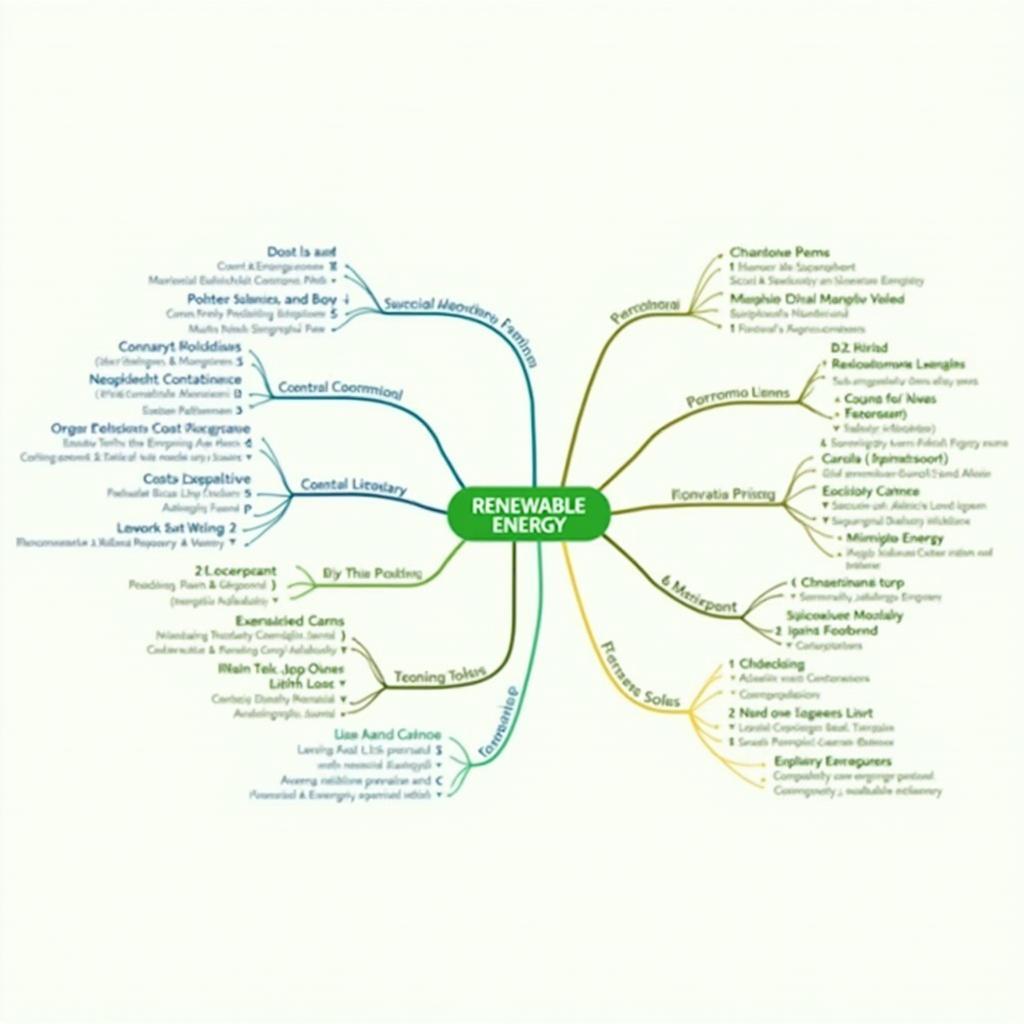 Essential Vocabulary for IELTS Writing Task 2 Renewable Energy Essays
Essential Vocabulary for IELTS Writing Task 2 Renewable Energy Essays
High-Scoring Sentence Structures
1. Complex Subordination with Concessive Clauses
Formula: Although/While + [concession], [main argument]
Example from Band 8-9 essay: “Although initial costs are substantial, the operational expenses of renewable facilities are minimal compared to fossil fuel plants that require constant fuel purchases.”
Why it scores well: This structure demonstrates sophisticated argumentation by acknowledging opposing views before refuting them, showing critical thinking and balanced analysis.
Additional examples:
- While renewable energy presents intermittency challenges, technological advances in battery storage are rapidly addressing these concerns.
- Although developing nations face financial constraints, international funding mechanisms can facilitate renewable energy adoption.
- Despite the high capital requirements, the long-term economic returns justify the initial investment.
Common mistakes to avoid:
- ❌ Using both “although” and “but” in the same sentence: “Although it’s expensive, but it’s worth it.”
- ❌ Forgetting the comma after the subordinate clause: “Although costs are high the benefits remain significant.”
2. Non-Defining Relative Clauses
Formula: [Noun], which/who + [additional information], [continuation]
Example from Band 8-9 essay: “The renewable sector is a powerful engine for job creation, with the International Renewable Energy Agency reporting that the industry employed 12 million people globally in 2020, a figure projected to reach 42 million by 2050.”
Why it scores well: Adds sophisticated detail and demonstrates the ability to incorporate supplementary information smoothly, showing advanced sentence construction skills.
Additional examples:
- Solar panel costs, which have declined by over 80% since 2010, now make renewable energy economically viable for most nations.
- Denmark, which derives more than 40% of its electricity from wind power, exemplifies successful renewable integration.
- Battery storage technology, which addresses intermittency issues, has improved dramatically in recent years.
Common mistakes to avoid:
- ❌ Omitting commas: “Solar energy which is abundant can power entire cities.”
- ❌ Using “that” instead of “which” in non-defining clauses: “Renewable energy, that is sustainable, should be prioritized.”
3. Participial Phrases
Formula: [Present/Past participle phrase], [main clause] OR [Main clause], [participle phrase]
Example from Band 8-9 essay: “Unlike fossil fuels, renewable sources produce negligible greenhouse gas emissions, directly addressing the climate crisis that threatens global ecosystems.”
Why it scores well: Creates sentence variety and demonstrates the ability to convey complex cause-effect relationships concisely and elegantly.
Additional examples:
- Having recognized the urgency of climate change, governments worldwide are accelerating renewable energy deployment.
- Renewable energy eliminates air pollution, thereby preventing millions of premature deaths annually.
- Investing heavily in solar infrastructure, China has become the world’s leading producer of photovoltaic panels.
Common mistakes to avoid:
- ❌ Dangling participles: “Walking through the city, air pollution was visible everywhere.” (The air pollution wasn’t walking!)
- ❌ Incorrect tense: “Having installed solar panels, the electricity bills reduced significantly.” (Use: “the homeowner reduced”)
4. Cleft Sentences for Emphasis
Formula: It is [noun/phrase] that/which [verb] OR What [subject] [verb] is [complement]
Example modification: “It is the overwhelming environmental and economic advantages of renewable energy that make it an indispensable investment in humanity’s future.”
Why it scores well: Emphasizes key points effectively, showing the writer’s ability to guide reader attention and create persuasive impact.
Additional examples:
- What makes renewable energy particularly attractive is its potential to create millions of jobs.
- It is the declining costs of solar technology that have transformed the energy landscape.
- What governments must recognize is that renewable energy represents both environmental necessity and economic opportunity.
Common mistakes to avoid:
- ❌ Incorrect pronoun: “It is the benefits of solar energy what make it attractive.”
- ❌ Subject-verb disagreement: “It is renewable sources that requires attention.”
5. Advanced Conditionals (Mixed and Inverted)
Formula: Had + [subject] + [past participle], [subject] + would/could + [verb] OR Should + [subject] + [verb], [subject] + will/would + [verb]
Example creation: “Had governments invested more heavily in renewable infrastructure decades ago, current carbon emissions would be significantly lower.”
Why it scores well: Demonstrates mastery of complex grammatical structures and the ability to discuss hypothetical situations with precision.
Additional examples:
- Should nations prioritize renewable energy development, they could achieve energy independence within decades.
- Were fossil fuel subsidies redirected toward clean energy, the transition would accelerate dramatically.
- Had technology advanced at its current pace earlier, renewable energy would have replaced fossil fuels long ago.
Common mistakes to avoid:
- ❌ Mixing conditional types incorrectly: “If governments invested yesterday, emissions would be lower now.” (Use: “Had governments invested”)
- ❌ Forgetting inversion: “If governments should invest more…” (Use: “Should governments invest more…”)
6. Inversion for Emphasis
Formula: Not only + [auxiliary] + [subject] + [verb], but also [clause] OR Rarely/Seldom + [auxiliary] + [subject] + [verb]
Example creation: “Not only does renewable energy reduce carbon emissions, but it also enhances national energy security and creates sustainable employment.”
Why it scores well: Creates sophisticated emphasis and demonstrates advanced grammatical control, distinguishing high-band essays from intermediate ones.
Additional examples:
- Rarely have technological advances transformed an industry as rapidly as solar innovation has revolutionized energy production.
- Not only are renewable sources environmentally superior, but they are also becoming increasingly cost-effective.
- Never before has the transition to clean energy been more urgent or more achievable.
Common mistakes to avoid:
- ❌ Forgetting inversion after negative adverbs: “Not only renewable energy reduces emissions, but…”
- ❌ Incorrect auxiliary verb: “Rarely renewable energy has been so affordable.”
For comprehensive understanding of how these structures apply to different contexts, exploring benefits of renewable energy provides numerous authentic examples across various environmental and economic scenarios.
Self-Assessment Checklist
Before Writing (5 minutes)
Question Analysis:
- ☐ Have I identified the question type (opinion, discussion, problem-solution)?
- ☐ Have I underlined key terms in the question?
- ☐ Do I understand exactly what the question is asking?
- ☐ Have I determined my position/answer to the question?
Planning:
- ☐ Have I brainstormed at least 2-3 main ideas for each body paragraph?
- ☐ Have I identified specific examples or evidence to support my points?
- ☐ Have I decided on my essay structure (number of paragraphs)?
- ☐ Do I have a clear thesis statement that directly answers the question?
While Writing (35 minutes)
Introduction (5 minutes):
- ☐ Have I paraphrased the question rather than copying it directly?
- ☐ Does my thesis statement clearly state my position?
- ☐ Is my introduction 2-3 sentences (approximately 40-50 words)?
Body Paragraphs (20 minutes):
- ☐ Does each paragraph begin with a clear topic sentence?
- ☐ Have I provided specific examples or evidence (not just general statements)?
- ☐ Have I used cohesive devices to connect ideas within paragraphs?
- ☐ Are my paragraphs balanced in length (not one very short, one very long)?
- ☐ Have I developed each idea sufficiently before moving to the next point?
Conclusion (3 minutes):
- ☐ Have I summarized my main points without introducing new ideas?
- ☐ Have I restated my position clearly?
- ☐ Is my conclusion 2-3 sentences (approximately 40-50 words)?
Language Use (Throughout):
- ☐ Am I using a variety of sentence structures (simple, compound, complex)?
- ☐ Am I using topic-specific vocabulary appropriately?
- ☐ Am I avoiding repetition by using synonyms and paraphrasing?
- ☐ Have I used at least 2-3 advanced grammatical structures?
After Writing (10 minutes)
Task Achievement:
- ☐ Have I addressed all parts of the question?
- ☐ Is my position clear and consistent throughout?
- ☐ Have I written at least 250 words? (Count them!)
- ☐ Are my ideas relevant to the topic?
Grammar Check:
- ☐ Have I checked subject-verb agreement in every sentence?
- ☐ Have I used correct verb tenses consistently?
- ☐ Have I checked article usage (a, an, the)?
- ☐ Are my complex sentences grammatically correct?
- ☐ Have I avoided run-on sentences and fragments?
Vocabulary Check:
- ☐ Have I spelled words correctly (especially topic-specific terms)?
- ☐ Have I used collocations naturally (e.g., “make a decision” not “do a decision”)?
- ☐ Have I avoided informal language or contractions?
- ☐ Have I used academic vocabulary appropriately?
Coherence Check:
- ☐ Does my essay flow logically from one idea to the next?
- ☐ Have I used cohesive devices appropriately (not overused)?
- ☐ Are my paragraphs clearly separated?
- ☐ Can a reader easily follow my argument?
Mechanics:
- ☐ Have I indented or skipped a line between paragraphs?
- ☐ Is my handwriting legible (for paper-based test)?
- ☐ Have I used proper punctuation throughout?
Time Management Tips
40-Minute Strategy:
- Minutes 0-5: Read and analyze question, brainstorm ideas, create outline
- Minutes 5-10: Write introduction with clear thesis
- Minutes 10-28: Write body paragraphs (approximately 9 minutes per paragraph)
- Minutes 28-33: Write conclusion
- Minutes 33-40: Review, edit, and correct errors
Red Flags – Stop and Fix Immediately:
- ❌ You’re 20 minutes in and haven’t finished your introduction
- ❌ You’ve written 150 words but have run out of ideas
- ❌ You realize you’ve misunderstood the question halfway through
- ❌ Your position keeps changing between paragraphs
Green Lights – You’re on Track:
- ✅ You finish your introduction within 5-7 minutes
- ✅ Each body paragraph has a clear topic sentence and 2-3 supporting points
- ✅ You reach 250 words with 10 minutes remaining for review
- ✅ Your examples are specific and relevant
Conclusion
Mastering IELTS Writing Task 2 on renewable energy topics requires more than just understanding the subject matter—it demands strategic essay construction, varied grammatical structures, and precise vocabulary usage. Throughout this guide, we’ve examined how different band levels approach the same question, revealing that the key differentiators are specificity of examples, sophistication of language, and depth of argumentation.
The journey from Band 6 to Band 7 typically requires 2-3 months of focused practice, emphasizing grammatical accuracy and vocabulary expansion. Moving from Band 7 to Band 8-9 demands additional refinement: incorporating complex sentence structures naturally, using precise academic vocabulary, and developing arguments with compelling specific examples. Remember that Costa Rica’s 99% renewable achievement, Germany’s grid management challenges, and IRENA’s employment statistics are the types of concrete details that distinguish high-band essays.
Your Path to Improvement:
- Week 1-2: Master the question types and practice analyzing prompts thoroughly before writing
- Week 3-4: Focus on eliminating grammatical errors, particularly subject-verb agreement and article usage
- Week 5-6: Expand your vocabulary range with topic-specific terms and academic collocations
- Week 7-8: Practice incorporating complex sentence structures naturally
- Week 9-12: Write full timed essays weekly and seek feedback from experienced instructors
Take Action Today:
Practice writing your own response to the question analyzed in this article. Time yourself strictly for 40 minutes, then compare your essay against the Band 8-9 sample, identifying specific areas for improvement. Share your essay in the comments below—our community of learners provides supportive feedback that accelerates improvement.
Additional Resources:
- Official IELTS band descriptors (available on British Council and IDP websites)
- Authentic practice tests from Cambridge IELTS series (books 14-18)
- Topic-specific vocabulary lists for common IELTS themes (environment, technology, education)
Remember, consistent practice with authentic materials, combined with targeted improvement of specific weaknesses, yields measurable results. The difference between Band 6.5 and Band 8 often lies not in dramatic transformations but in systematic attention to detail, grammatical accuracy, and argumentative depth. Start your practice today, and within three months, you’ll see significant improvement in your writing scores.
Your IELTS success story begins with a single practice essay. Set your timer for 40 minutes and write your response now.
